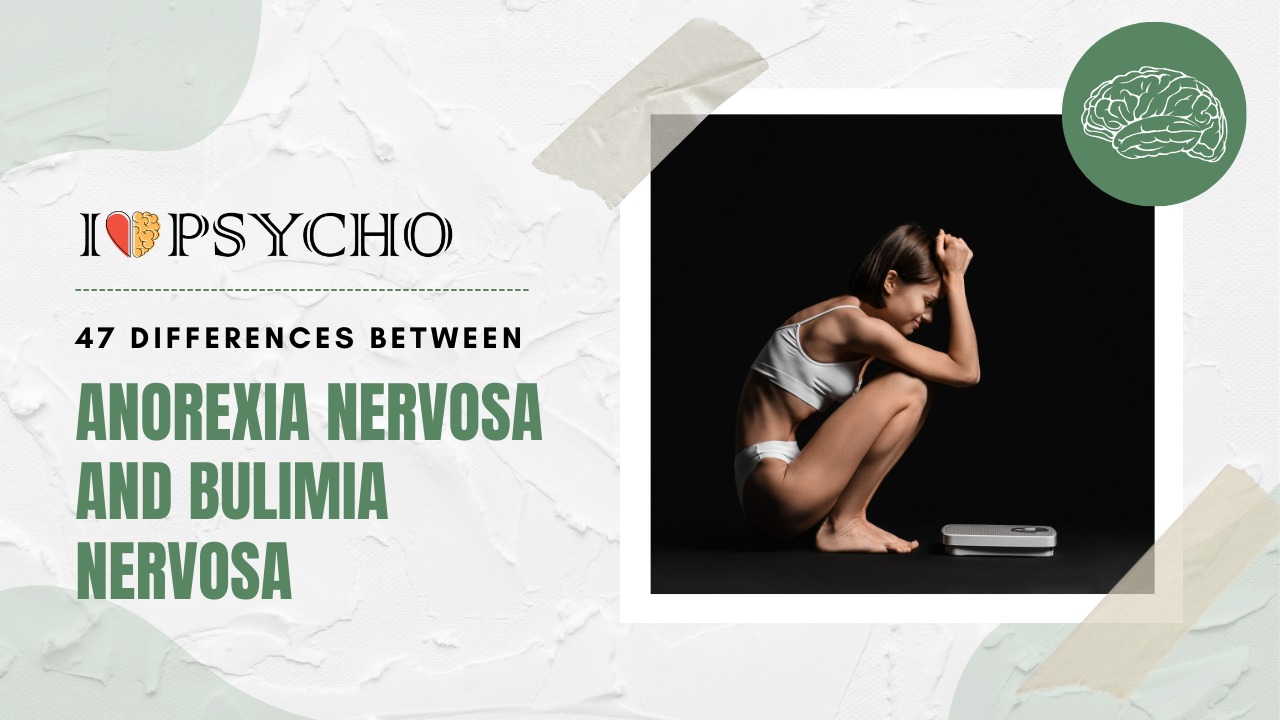Anorexia and Bulimia can have serious physical, emotional, and psychological implications. Despite similarities, their food habits, health results, and actions differ. Dietary restriction, weight anxiety, and body image issues characterize anorexia Nervosa. Even when dangerously underweight, anorexics regard themselves as overweight. Extreme calorie counting, excessive activity, and restrictive diet may occur. The condition can cause organ damage, starvation, and death if neglected.
In contrast, Bulimia Nervosa involves binge eating and purging. Binge eaters feel out of control and eat a lot of food quickly. They utilize self-induced vomiting, laxatives, or extreme exercise to lose weight due to guilt, humiliation, and weight increase phobia. Bulimia sufferers may carry a normal weight, making it tougher to diagnose just on looks. The influence on physical health is also important. Weight loss from anorexia can cause brittle bones, cardiac abnormalities, and hormone imbalances. Essential nutrient deficiency affects nearly every organ system. Bulimia’s binge-purge cycle can induce electrolyte imbalances, heart troubles, gastrointestinal disorders, and tooth degradation due to stomach acid exposure during purging.
Psychologically, anorexia entails severe perfectionism and a need for control, whereas bulimia involves impulsivity and a loss of control during binge episodes. Following medical stabilization, anorexia may require nutritional rehabilitation and counseling for emotional and cognitive issues. Binge-purge therapy, trigger management, and coping skills are common in bulimia treatment. Finally, while Anorexia Nervosa and Bulimia Nervosa are significant eating disorders, their behaviors, attitudes, physical health effects, and psychological bases differ.
Also Read: An Introduction to Consciousness: Its History and Theories
|
S.No. |
Aspect |
Anorexia Nervosa |
Bulimia Nervosa |
|
1 |
Primary Symptom |
Severe restriction of food intake |
Binge-eating followed by purging behaviors |
|
2 |
Body Weight |
Significant underweight is common |
Weight may be normal or slightly overweight |
|
3 |
Perception of Body |
Intense fear of weight gain |
Fear of weight gain but may maintain weight |
|
4 |
Eating Behavior |
Severely restricted food intake |
Episodes of overeating and purging |
|
5 |
Frequency of Eating Episodes |
Infrequent meals, often skipping |
Regular episodes of binge eating |
|
6 |
Control over Eating |
Strong need for control over food |
Loss of control during binge episodes |
|
7 |
Caloric Intake |
Drastically reduced caloric intake |
Excessive caloric intake during binges |
|
8 |
Weight Loss |
Significant weight loss is common |
Weight may fluctuate but often maintained |
|
9 |
Purging Behaviors |
Rarely engage in purging behaviors |
Frequent purging behaviors (e.g., vomiting) |
|
10 |
Physical Consequences |
May suffer from malnutrition and organ damage |
May experience dental problems and electrolyte imbalances |
|
11 |
Exercise Patterns |
May engage in excessive exercise |
May use exercise as a form of compensation |
|
12 |
Meal Planning |
Obsessive meal planning and avoidance of certain foods |
Binge eating often involves high-calorie, high-fat foods |
|
13 |
Body Image Disturbance |
Intense dissatisfaction with body image |
Dissatisfaction but weight is often maintained |
|
14 |
Denial of Severity |
Often deny the seriousness of their condition |
May recognize the problem but struggle to control it |
|
15 |
Social Isolation |
May withdraw from social interactions |
May try to hide their bulimic behaviors |
|
16 |
Emotional Regulation |
May use food restriction to cope with emotions |
Use binge-purge cycle as an emotional coping mechanism |
|
17 |
Diagnostic Criteria |
Meets criteria for anorexia nervosa |
|
|
18 |
Physical Appearance |
Emaciated appearance is common |
Weight may be within a normal range |
|
19 |
Body Mass Index (BMI) |
Often below 17.5 (severely underweight) |
Typically falls within a normal BMI range |
|
20 |
Laxative and Diuretic Use |
Rarely use these methods |
May use laxatives and diuretics to purge |
|
21 |
Appetite |
Reduced appetite, avoidance of food |
Intermittent loss of control over eating |
|
22 |
Food Rituals |
May engage in rigid food rituals |
Less rigid food rituals, more chaotic |
|
23 |
Hair and Skin |
May experience thinning hair and dry skin |
Skin and hair may be affected by frequent vomiting |
|
24 |
Menstrual Irregularities |
Often lose menstrual periods |
May experience irregular or missed periods |
|
25 |
Dental Health |
Generally good dental health |
Risk of dental problems due to vomiting |
|
26 |
Motivation for Behavior |
Fear of gaining weight or being fat |
Fear of gaining weight and body dissatisfaction |
|
27 |
Emotional Consequences |
May experience depression and anxiety |
May have mood swings, depression, and guilt |
|
28 |
Duration of Binge-Purge Episodes |
Rarely engage in binge-purge episodes |
Frequent episodes of binge eating followed by purging |
|
29 |
Awareness of Problem |
May lack awareness of their condition |
Often aware of their bulimic behaviors |
|
30 |
Age of Onset |
Typically begins in adolescence |
Often begins in late adolescence or early adulthood |
|
31 |
Impact on Social Life |
May isolate themselves from social activities |
Social life may be disrupted due to secretive behavior |
|
32 |
Recovery Challenges |
May resist treatment and recovery |
May struggle with relapses and maintaining recovery |
|
33 |
Physical Weakness |
May experience physical weakness |
Physical strength may be affected by purging behavior |
|
34 |
Risk of Dehydration |
High risk of dehydration |
Risk of dehydration due to purging |
|
35 |
Treatment Approach |
Cognitive-behavioral therapy is often used |
|
|
36 |
Mortality Rate |
Has a high mortality rate if untreated |
Mortality rate is lower than anorexia nervosa |
|
37 |
Medical Complications |
Organ damage and failure are common |
Dental problems, electrolyte imbalances, and gastrointestinal issues |
|
38 |
Cognitive Distortions |
Distorted perception of body size |
Distorted perception of body size and shape |
|
39 |
Secretiveness |
Often secretive about eating habits |
Often secretive about binge-purge behaviors |
|
40 |
Weight Fluctuations |
Consistent weight loss or maintenance |
Weight fluctuations due to binge-purge cycle |
|
41 |
Preoccupation with Food |
Obsessive thoughts about food and weight |
Preoccupied with food during binges |
|
42 |
Physical Strength |
Reduced physical strength |
Strength may be impacted by purging behavior |
|
43 |
Restrictive Eating |
Characterized by extreme food restriction |
Involves episodes of excessive food intake |
|
44 |
Risk of Electrolyte Imbalance |
Lower risk of electrolyte imbalances |
Higher risk of electrolyte imbalances |
|
45 |
Risk of Osteoporosis |
Increased risk due to malnutrition |
Risk may be lower due to weight maintenance |
|
46 |
Hospitalization |
May require hospitalization for severe cases |
Hospitalization may be necessary in severe cases |
|
47 |
Treatment Emphasis |
Emphasis on weight restoration |
Emphasis on addressing binge-purge behaviors |
Also Read: A Brief History of The Counseling Process and Its Stages
Frequently Asked Questions (FAQs)
Q.1 What distinguishes Anorexia Nervosa from Bulimia Nervosa?
A skewed body image, severe dietary restriction, and excessive fear of weight gain cause considerable weight loss in Anorexia Nervosa. Bulimia Nervosa involves binge eating and purging with vomiting or excessive activity to burn calories. Both diseases are dangerous, but anorexia is characterized by extreme underweight, whereas bulimia is usually moderate.
Q.2 Do these illnesses share psychological traits?
There are shared psychological components. Anorexia and bulimia can result from body dissatisfaction, low self-esteem, and body image distortions. Both illnesses can cause anxiety, melancholy, and eating-related guilt.
Q.3 What are the health risks of these disorders?
Malnutrition from Anorexia Nervosa can cause cardiac difficulties, osteoporosis, and hormone abnormalities. Bulimia Nervosa’s binge-purge cycle can cause electrolyte imbalances, heart troubles, gastrointestinal disorders, and teeth concerns from stomach acid exposure.
Q.4 Can these diseases coexist or change?
Yes, people can have both illnesses or switch between them. This is called “diagnostic crossover.” Some people with anorexia become bulimic. These difficulties require proper diagnosis and therapy assessment.
Q.5 How are Anorexia and Bulimia treated?
Treatment for both illnesses must be extensive. Treatment frequently includes medical, dietary, and psychological therapies. Medical stabilization, dietary rehabilitation, and cognitive-behavioral or family-based treatment are typical. Weight restoration and nutritional rehabilitation are essential for anorexia. Therapists treat bulimia by stopping the binge-purge cycle, improving coping skills, and treating psychological issues.









